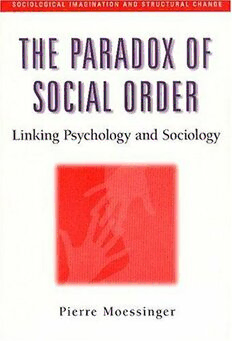
The Paradox of Social Order: Linking Psychology and Sociology (Sociological Imagination and Structural Change) PDF
165 Pages·2000·9.019 MB·English
Most books are stored in the elastic cloud where traffic is expensive. For this reason, we have a limit on daily download.
Preview The Paradox of Social Order: Linking Psychology and Sociology (Sociological Imagination and Structural Change)
Description:
This volume focuses on strengthening the foundations of the social sciences with hypotheses that challenge commonly held rational choice theories drawn from economics. In contrast to the rational choice theories of Becker, Hayek, Popper, and others, Moessinger argues that the stability of social structures ultimately results from a linkage of non-rational individual conduct (interpersonal imbalances, confusion of minds, etc.) with social order and hence, that a larger role for psychology is essential for the study of the social sciences. This work is an attempt at cross-fertilization of disciplines. Both of these fields are now limited, fragmented, and scattered. In the social sciences we often have to be content with a few pieces (hypotheses, theories) of a provisional construction, pieces that will be quickly modified or replaced. In this precarious situation for the social sciences, what we can do better, what we must try to do better, is to differentiate and generalize our hypotheses and integrate them into the best-established network of knowledge in order to ensure that they continue to develop. In other words, we have to articulate and systematize the social sciences, in particular to reunite sociology and psychology. Social order emerges from non-rational individual behavior (which social order, in turn, upholds). To express it positively, social order and individual non-rationality together make up a whole. The author holds that metaphors such as "machine" or "organism" are no longer adequate. Social order can no longer be conceived in terms of a dualistic framework. Social order is not some magical equilibrium that is justified by the satisfactions it produces--to all, to the most capable, or only to those in power, depending upon the justification. Nor can social order be considered either the product of either an invisible hand or of an omnipresent secretary who balances everyone's account. This work is an effort to move beyond the polarities and dualities that limit the theory and research of social science as a whole. Pierre Moessinger is professor in the Department of Sociology at the University of Geneva, Switzerland and the Department of Psychology at the University of Fribourg. He has published in English-language journals in several fields and is the editor of New Ideas in Psychology.
See more
The list of books you might like
Most books are stored in the elastic cloud where traffic is expensive. For this reason, we have a limit on daily download.
